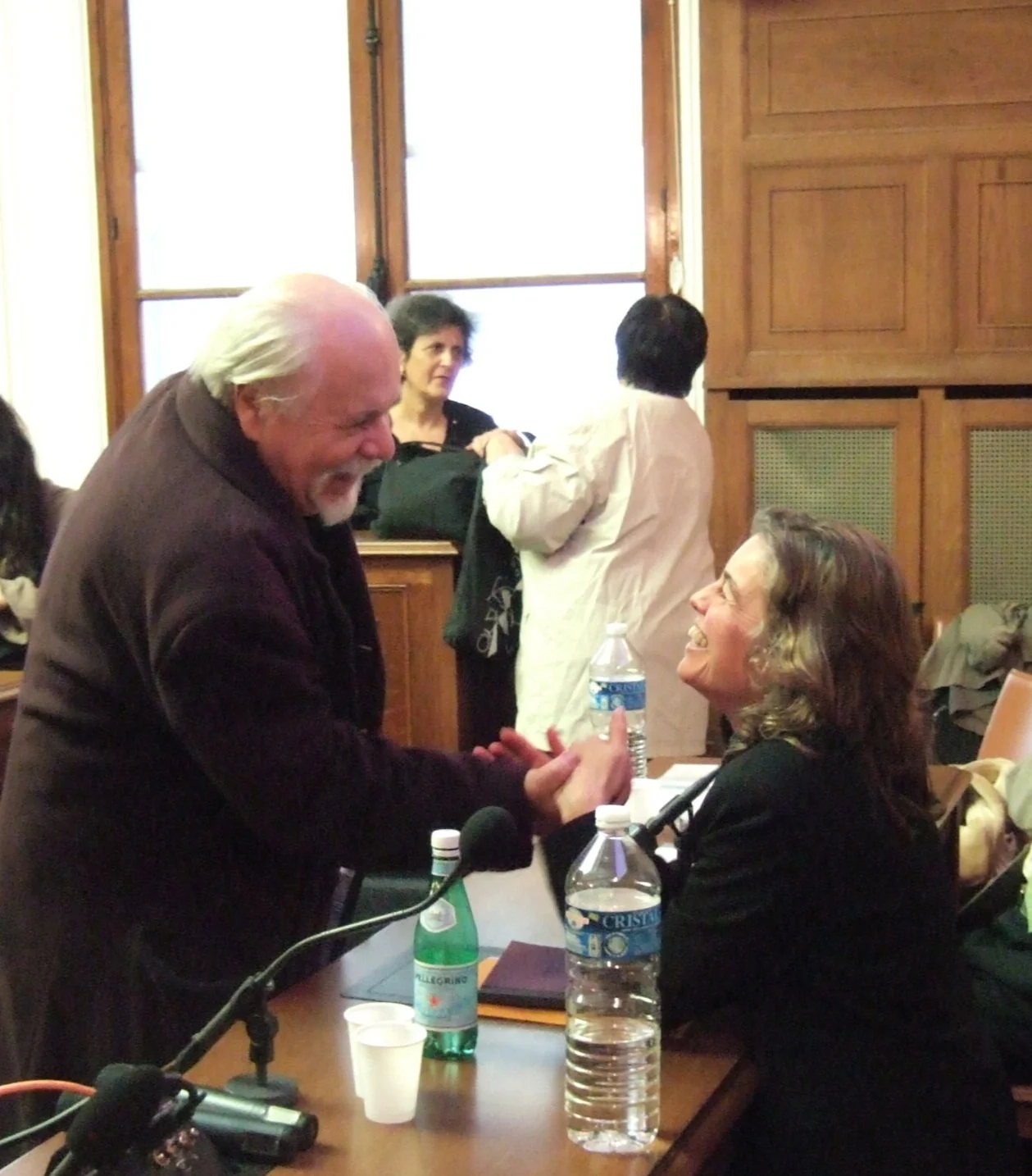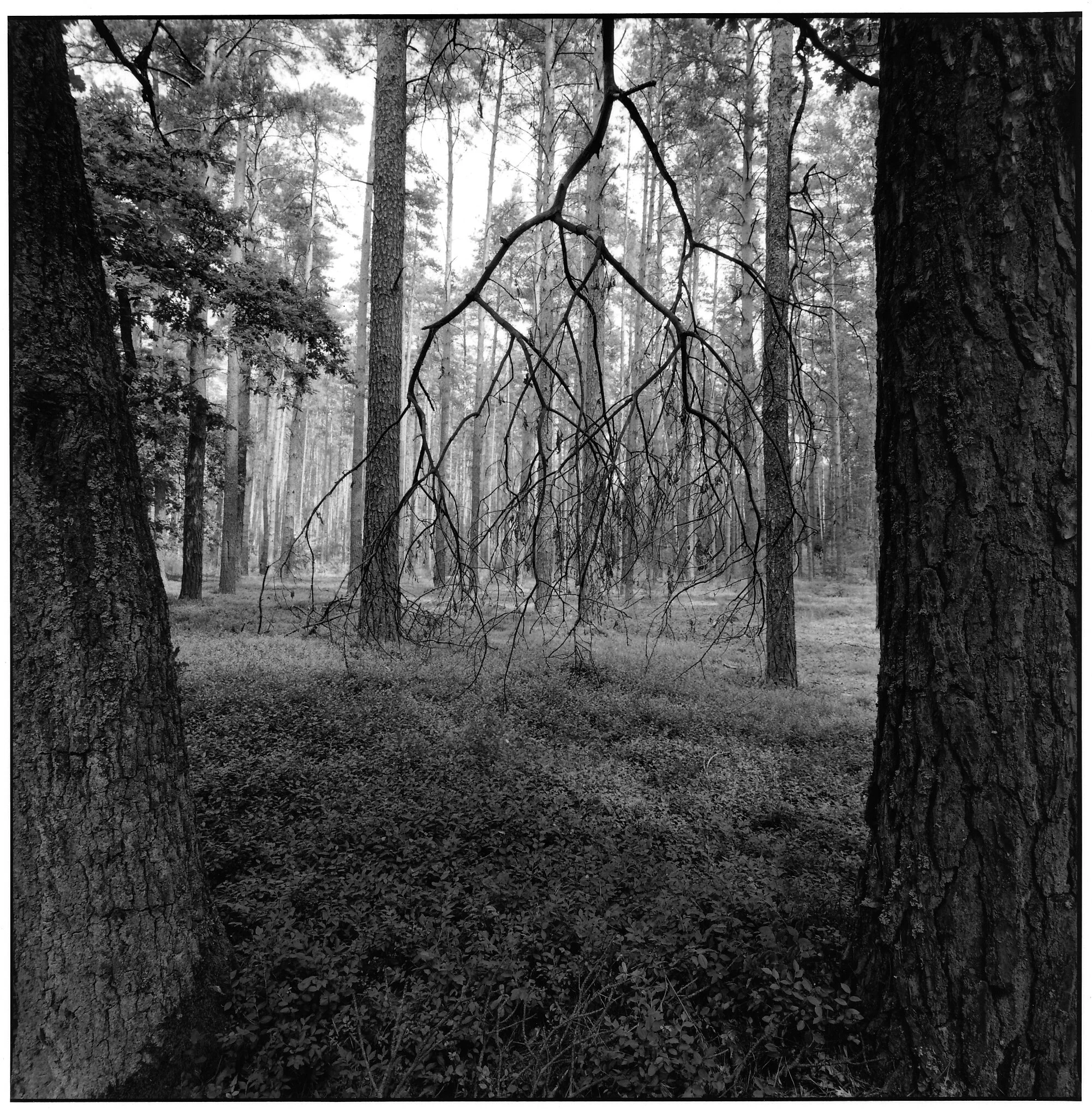Grotowski, Women, and Contemporary Performance: Meetings with Remarkable Women
(Routledge 2014 - Open Access)
Canadian Association for Theatre Research Ann Saddlemyer Book Award Honorable Mention
As the first examination of women’s foremost contributions to Jerzy Grotowski’s cross-cultural investigation of performance, this monograph complements and broadens existing literature by offering a more diverse and inclusive re-assessment of Grotowski’s legacy, thereby probing its significance for contemporary performance practice and research.
Although the particularly strenuous physical training emblematic of Grotowski’s approach is not gender specifc, it has historically been associated with a masculine conception of the performer incarnated by Ryszard Cieslak in The Constant Prince, thus overlooking the work of Rena Mirecka, Maja Komorowska, and Elizabeth Albahaca, to name only the leading women performers identified with the period of theatre productions. This book therefore redresses this imbalance by focusing on key women from different cultures and generations who share a direct connection to Grotowski’s legacy while clearly asserting their artistic independence.
These women actively participated in all phases of the Polish director’s practical research, and continue to play a vital role in today’s transnational community of artists whose work reflects Grotowski’s enduring influence. Their approaches often cross the boundaries of aesthetic and ritual performance, and I explore the interrelation of creativity, embodiment, agency, and spirituality within their performing and teaching. I situate my embodied research at the intersection of performance studies, cultural anthropology, and Indigenous epistemologies, and ground my investigation in four years of multi-sited fieldwork funded by two major grants from the Social Sciences and Humanities Research Council of Canada.
I observe that the physical and vocal training transmitted by these artists through their teaching sustains an interconnection between the organicity of the human body and the organicity of the natural world, inducing the performer to experience within her organism the flow of energy which characterizes the life of natural ecosystems. I infer that this alternative performance paradigm is grounded in what I define as an ecosystemic conception of organicity derived from the scientific hypothesis that human life and natural ecosystems share fundamental features. I suggest that this ecosystemic performance paradigm supports an ecological understanding of performance, in the broader sense of ecology articulated by Indigenous scholars, pointing to alternative conceptions of creativity, embodiment, and spirituality that challenge anthropocentric and gendered conceptions of agency.
Published in the Routledge Advances in Theatre and Performance Studies Series in 2014, this monograph and its seven companion documentary films, featured on the Routledge Performance Archive, are based on research funded by a Standard Research Grant ($71,625) and a Research/Creation in Fine Arts Grant ($125,793) from the Social Sciences and Humanities Research Council of Canada.
Forest of Brzezinka, Poland – photo by Celeste Taliani.
2009 Year of Grotowski (UNESCO)
UNESCO designated 2009 as the “Year of Grotowski,” as it marked the 10th anniversary of Jerzy Grotowski's death, 50 years since he and Ludwik Flaszen took over the Theatre of the 13 Rows in Opole (later the Laboratory Theatre), and the 25th anniversary of the dissolution of the Laboratory Theatre. For “2009 Year of Grotowski,” I organized, with the assistance of Stefania Gardecka and Justyna Rodzinska-Nair, a month-long Laboratory of Creative Research and a festival of live performance hosted by the Grotowski Institute in Wroclaw, Poland.
The Laboratory of Creative Research consisted of five work sessions led by women artists from different generations and cultural legacies: Rena Mirecka (Poland), Iben Nagel Rasmussen (Denmark), Katharina Seyferth (Germany), Ang Gey Pin (Singapore), and Dora Arreola (Mexico). These works sessions took place at the Grotowski Institute as well as at the forest-based work space of Brzezinka.
There were seventeen work session participants from eleven countries, including myself and two UBC BFA students, Tracy Valcarcel and Natalia Hautala, as well as two UBC MFA students, Nicole Cormaci and Lara Haworth, as seen in the “Meetings with Remarkable Women” documentary film series, which I produced in close collaboration with the artists, and which is featured on the Routledge Performance Archive. The films and photos documenting this project were created by Maciej Stawinski, Francesco Galli, Celeste Taliani, Chiara Crupi, and Maciej Zakrzewski. The “Meetings with Remarkable Women” poster and frontispiece of my book was created by Piotr Gardecki.

Meetings with Remarkable Women, Grotowski Institute, Wroclaw, Poland 2009 - photo by Francesco Galli.

Stefania Gardecka introducing the project - photo by Francesco Galli.

Rena Mirecka - photo by Francesco Galli.

Maja Komorowska and Elizabeth Albahaca - photo by Francesco Galli.

Ewa Benesz - photo by Francesco Galli.

Justyna Rodzinska-Nair, Stefania Gardecka, and Mariane Ahrne - photo by Francesco Galli.

Iben Nagel Rasmussen rehearsing Ester's Book - photo by Francesco Galli.

Katharina Seyferth rehearsing Rooms - photo by Francesco Galli.

Ang Gey Pin rehearsing Feast of You Shen - photo by Maciej Zakrzewski.

Rena Mirecka with the author - photo by Maciej Stawinski.

Rena Mirecka's work session - photo by Maciej Stawinski.

Rena Mirecka with the author - photo by Maciej Stawinski.

Iben Nagel Rasmussen's work session - photo by Francesco Galli.

Iben Nagel Rasmussen with Tracy Valcarcel - photo by Francesco Galli.

Iben Nagel Rasmussen - photo by Francesco Galli.

Katharina Seyferth - photo by Francesco Galli.

Katharina Seyferth's work session - photo by Celeste Taliani.

Center: Katharina Seyferth leading The Vigils. Right: Nicole Cormarci - photo by Francesco Galli.

The author (right), during Katharina Seyferth's work session - photo by Celeste Taliani.
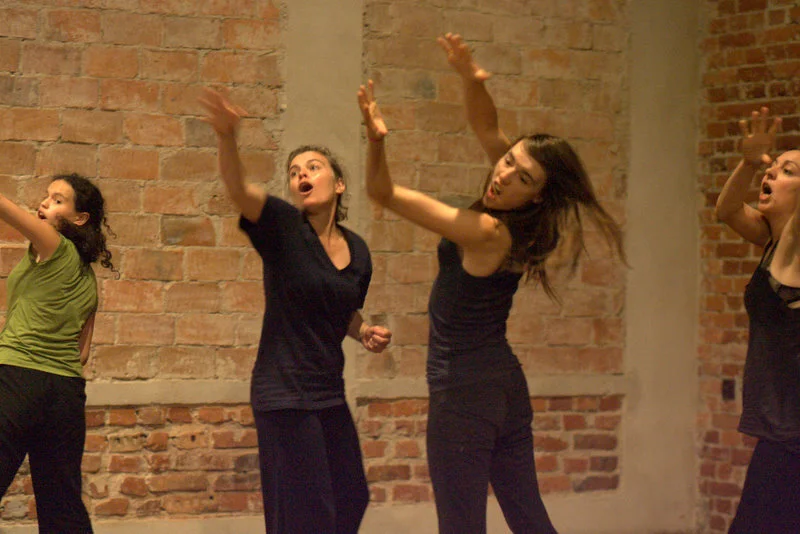
Sofia Monsalve Fiori, the author and Lara Haworth, during Iben Nagel Rasmussen's work session - photo by Francesco Galli.

Sofia Monsalve Fiori with the author - photo by Francesco Galli.

Dora Arreola's work session - photo by Francesco Galli.
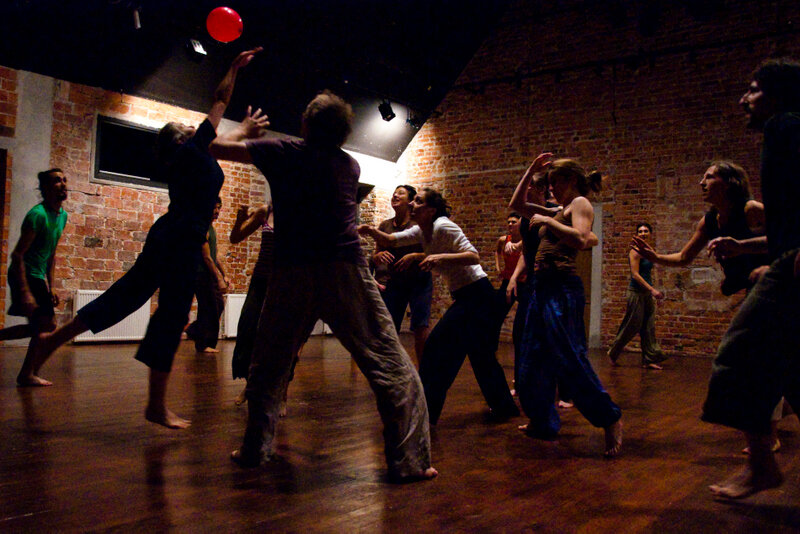
Ang Gey Pin's work session - photo by Maciej Zakrzewski.

Natalia Hautala - photo by Francesco Galli.

Ang Gey Pin - photo by Maciej Zakrzewski.
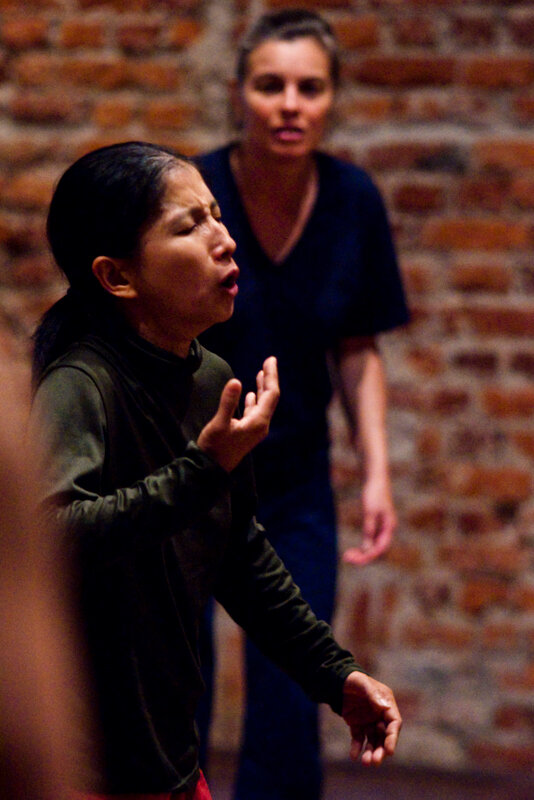
Ang Gey Pin and the author - photo by Maciej Zakrzewski.

Tracy Valcarcel - photo by Celeste Taliani.

Tracy Valcarcel - photo by Celeste Taliani.

Ewa Benesz's work session in Sardinia, 2010.
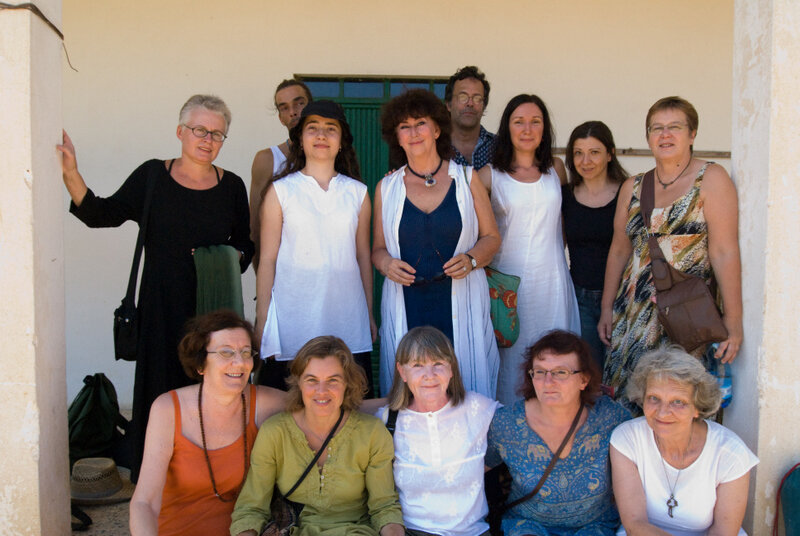
Meetings with Remarkable Women in Sardinia, 2010 - photo by Celeste Taliani.
“2009 Year of Grotowski” Conferences in Europe and North America
I was invited to present my research at “2009 Year of Grotowski” Conferences in Krakow, Paris, Canterbury, and New York. I was also commissioned by the Polish Embassy in Ottawa to curate a “2009 Year of Grotowski” series of cultural events in Canada, including a work session led by Rena Mirecka.
Canadian Association for Theatre Research Ann Saddlemyer Book Award Honorable Mention:
Grotowski Institute - photo by Francesco Galli.
Virginie Magnat’s Grotowski, Women, and Contemporary Performance: Meetings with Remarkable Women, is the result of a vital and timely scholarly project… As a trained performer coming from a Grotowski-based tradition, Magnat carefully negotiates a variety of key methodologies drawn from performance ethnography in order to present an intimate and compelling portrait of women [artists]. ...Magnat proposes steps towards what she describes as an ‘ecology of the body-in-life’... [that] would fuse ritual and performance to allow the rigour, audacity and poeticism of the women Magnat discusses to launch a whole new round of compelling transmission of performance, one that can respond to ... the significant patriarchally-induced global environmental challenges we currently find ourselves facing. - CATR Citation
Grotowski Institute - photo by Francesco Galli.
Reviews in Scholarly Journals:
“As both a scholar and a performer herself, Magnat’s research relies upon an interdisciplinary methodology, combining fieldwork, artistic collaboration with her subjects, and the articulation of her embodied research through writing. The result is an insightful account of the work of such artists as Rena Mirecka, Ewa Benesz, Katharina Seyferth, and Ang Gey Pin. This book will be a valuable resource for scholars interested in the work of Grotowski, Polish theatre, women theatre practitioners, as well as those engaged in practice-as-research.”
- Review by Tanya Dean, TDR 58:4, Winter 2014
“[Magnat’s] methodology is an exquisite ethnographic balance of researcher and participant ... I found she did a splendid job of placing [this study] within the context of Polish history. …Her overall argument follows a post-theatrical path in Communist Poland instead of capitalizing on Grotowski’s international reputation…The volume is a comprehensive collection of the practising female Grotowski practitioners...This is a valuable body of work... the first to give full attention to the female angle of Grotowski’s legacy.”
- Review by Lara Szypszak, Canadian Theatre Review 160 Fall 2014
“Influenced by the fields of indigenous and feminist research methodologies and her personal contact with Cree director, performer and writer Floyd Favel, Magnat lays out an approach that stresses the necessity of abandoning the position of a distanced, objective observer of cultural material... In bringing to light the work of these practitioners, Magnat also has the opportunity to further analyse the development of Grotowski’s Paratheatrical experiments – a period of his work that is often given only cursory or dismissive treatment in accounts that address the officially sanctioned direction of his work and successors….The book provides much interesting ethnographic detail and well-constructed arguments … Magnat is asking provocative and important questions, and offering access to a rich and fascinating realm of performance practice.”
- Review by Brian Schultis, Studies in Theatre and Performance 34:2, May 2014
Forest of Brzezinka. “Brzezinka Landscapes Project” funded by the Grotowski Institute and the University of Kent, Canterbury, 2008-09 – photo by Francesco Galli.
“Meetings with Remarkable Women” Documentary Film Series, Routledge Performance Archive
The Dream: Rena Mirecka’s Laboratory of Paratheatrical Research in Brzezinka
Rena Mirecka, a founding member and the leading actress of Grotowski’s Laboratory Theatre, leads a five-day work session in the forest-based work space of Brzezinka. This film features key elements of the training that Mirecka developed at the Laboratory Theatre, including the plastiques, as well as her unique approach to paratheatrical research. Cinematography: Maciej Stawinski. Grotowski Institute, Brzezinka, Poland, 2009. [link]
The Bridge of Winds: International Group of Theatrical Research Led by Iben Nagel Rasmussen
This film documents the work of Iben Nagel Rasmussen with her international group The Bridge of Winds. Rasmussen is a core member of Odin Teatret directed by Eugenio Barba, one of Grotowski’s close collaborators. Cinematography: Francesco Galli, Celeste Taliani, Chiara Crupi. Interviews: Virginie Magnat. Odin Teatret, Holstebro, Denmark, 2011. [link]
Work Session with Iben Nagel Rasmussen
A three-day work session introducing participants to key aspects of the training Rasmussen developed with her group, The Bridge of Winds, culminating in a Montage of Actions and Songs. Cinematography: Francesco Galli. Wroclaw, Poland, 2009.
Ewa Benesz - In the Act of Creating
This film documents the paratheatrical research and teaching of Ewa Benesz, Rena Mirecka’s close collaborator. Cinematography: Celeste Taliani. Sardinia, Italy, 2010 and 2011.
Brzezinka: An Introduction by Katharina Seyferth
Katharina Seyferth introduces the forest-based work space of Brzezinka, as she recounts her experience of Grotowski’s post-theatrical research known as “Paratheatre” and “Theatre of Sources.” Cinematography: Celeste Taliani. Grotowski Institute, Brzezinka, Poland, 2009.
Towards Organic Presence: On the Edge of Theatre – A Work Session with Katharina Seyferth
Katharina Seyferth’s training methodology includes yoga-based movement and plastiques, as well as exercises focusing on the passage from stillness to movement and accessing one’s organic drive. Cinematography: Celeste Taliani. Grotowski Institute, Brzezinka, Poland, 2009.
Rooms (after Tender Buttons, by Gertrude Stein)
This solo piece, conceived and directed by Katharina Seyferth, is based on Gertrude Stein’s Tender Buttons: Objects, Food, Rooms. Cinematography: Celeste Taliani and Francesco Galli. Meetings with Remarkable Women Festival, Grotowski Institute, Wroclaw, Poland, 2009.



